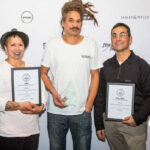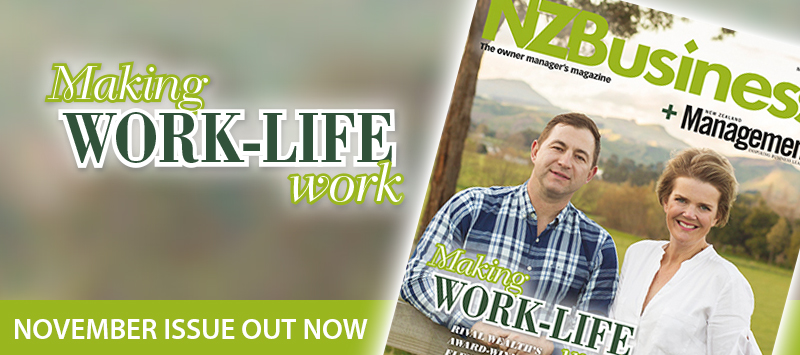How innovation delivers competitive advantage
New Zealand has always used innovation to maintain its competitive edge. NZBusiness asked five North Island high-achieving innovators to share their thoughts on how to succeed through innovation – starting […]
New Zealand has always used innovation to maintain its competitive edge. NZBusiness asked five North Island high-achieving innovators to share their thoughts on how to succeed through innovation – starting with Spaceworks’ Lizzi Whaley.
There was a cute distraction at Lizzi Whaley’s K-Road Spaceworks HQ the morning NZBusiness rocked up to research this story. Luckily there were other people there who could babysit the CEO’s totally lovable French bulldog, while we sat down to discuss innovation.
Lizzi believes many Kiwi business owners don’t know what innovation is, what it looks like for their business or where to start. Innovation can perhaps be better described as agility, she says. The agility to move where the market’s going, to what people want, and what your staff want.
“You don’t have to be clever; just ensure that you’re continually providing a product or service that the market wants.”
For designers in the the commercial interior design space, determining what the market wants has been made easier with the arrival of VR (virtual reality) and AR (augmented reality) technology. “It allows people to truly feel a workspace before we even build it. Design has gone to a whole new level; just supplying a 3D render on a 2D piece of paper now just feels so wrong,” says Lizzi. “The technology also allows our clients to be more innovative and ‘risky’ with their space, because they already know what it will look like.”
Lizzi talks of “intangible innovation” – how people work, how they like to work – and how the latest changes in interior design is quickly being embraced and adapted to by all ages.
Today there’s a “happy medium” promoted in workplace design referred to as activity-based working (ABW).
“Open plan is now not a space to be loud and noisy and collaborative. We want open plan to be quieter; you can be noisy and/or super-quiet in other spaces,” explains Lizzi. Even separate offices are making a slight comeback, she adds.
“And there’s innovation around support systems on how to be mobile, how to be productive, outside the work office.
Lizzi’s story of how she initially got into design under the tutelage of the late Prue Cook and then into entrepreneurship has been well documented. Today Spaceworks is one of New Zealand’s biggest design firms, with 20-plus staff and clients ranging across retail, office, hotel, hospitality, and aged-care. There’re branches in Auckland, Wellington and Christchurch, with Sydney and LA offices to follow.
The 41-year-old’s passion going forward is to build a global company network, as well as grow the talents of her “amazing designers” – to create opportunities where team members can benefit from design experience in an overseas office.
“We want to not only bring the world’s designs to New Zealand, but also take New Zealand design to other markets.”
Commercial interior design must tell a client’s brand story, Lizzi explains. And contrary to popular belief, aesthetics is one of the last considerations.
“It’s really about understanding the core of a client’s business. The outcome is design, but everything taken into account is back-end stuff. We’re consultants who must understand the essence of the business. Then we can design a solution for where they are and where they want to be.”
“It all comes back to the bottom-line – design should provide a return on investment. And better productivity and efficiency, which means greater profit.”
Good design benefits the whole work experience, she adds. It should work for the people employed in the business, and for those who engage externally with the business.
Lizzi says all business owners must innovate and take risks – albeit calculated risks. “Being conservative can only get you so far.
“But then if you are a risky person, like me, surround yourself with a balance of people who’re slightly more pro-risk than you, and those who’re a little less risky.”
We can all learn from people who are constantly innovative, says Lizzi. “With innovation you don’t have to lead the way, but you must be prepared to adapt off the back of other innovators.”
New Zealand is an early adopter around office design, workplace practice and co-working, she believes, but lags in other sectors. In retail, which is still mostly heavy on transactions and light on experience, there is still much work to do.
Determination and intelligence
Tommy Roff, founder of freeze-dried food specialist Fresh As, says his company innovates out of necessity – “if one approach isn’t working, try another”.
“I haven’t always thought of myself as an innovator, but I’m very good at joining dots and have a pretty good memory. This allows me to form new ideas based on my experiences and use these to create innovative products.”
Tommy believes in quality and point of difference. “With these two attributes you can be somewhat insulated from what’s happening in the economy. I never, ever, think about my business in terms of the economic climate. I concentrate on what we do and how we can do it better. If by doing this we succeed, then so be it.”
Tommy believes the single most important factor for anyone in business is determination and the right balance of determination and intelligence. “Too dumb, and you’ll keep going in the wrong direction; too smart, and you’ll quit.
“I’m not too sure why I do what I do, so I just keep doing it.
“You have to encourage people to have pride in what they do and not get caught up in what they should do, rather than what they want to do.
“Write the book, don’t read it!” he says.
Pushing the boundaries
Trish Peng wanted to be a fashion designer since she was seven. Her creative side kicked in at a young age. Today the creative director likes to push boundaries and think outside the box, which is why she caught the media’s attention at her last two New Zealand Fashion Week shows.
“The first year we broke the world record for the longest train ever to appear on a catwalk and the second year we made an entire gown out of fresh flowers.”
New Zealand’s fashion industry is threatened by international online competition so it’s important to deliver tailored solutions and advances in service, product and technology, and become a leading global brand, she says.
Innovators tend to be creative, perfectionists, patient, personable and, above all, they persevere through everything, Trish says. “The most successful businesses are the most innovative; they push the boundaries and start trends rather than copy them.”
For businesses to embrace innovation, leaders must remove the fear of failure and allow their team to come up with fresh ideas, she says. “And change workplace systems and procedures, especially when it comes to technology.”
Dare to dream
Danvers Devereux, owner of Matakana Botanicals, which exports 70 percent of its bath and body products, believes innovation is in his DNA.
Innovation for him is around the pleasure of designing, creating and building – be it for packaging, building, landscaping or designing.
“A lot of our products are inspired by special places growing uniquely special natural ingredients, which we then create a story and packaging around. We’re always looking for that point of difference and what makes it unique.”
Danvers recalls exhibiting at a trade show in Italy years ago. The exhibitor next door was a Dutch company with great heritage. “I asked their export manager what the key was to their success overseas. He said it’s all about being seen to be ‘innovative and leading the way locally’; then looking at the horizon to, in his words: ‘Act local, go global’.”
He believes Kiwis in general are very innovative. “It’s the DIY in our DNA.
“Our exporters must look at the big picture of marketing Kiwi products abroad and treat the world as their oyster. With the Kiwi dollar sliding, now’s the time to export!”
Successful business innovators can take an idea and convert it into a great product to sell, Danvers says, “and find someone to help them sell it, as some innovators simply don’t enjoy selling”.
“Dare to dream and then make it a reality. Just do it before someone else does!”
Be prepared to learn
Heletranz CEO and luxury tourism champion Sofia Ambler admits that she has always been entrepreneurial. “I’m constantly looking for options and strategies out of the normal way of doing things. I love collaborating with other brands and partners to offer exclusive and unexpected experiences,” she says.
With the lower NZD currently helping the export and tourism sectors, Sofia believes further investment in entrepreneurship will help New Zealand’s competitive edge – as well as more apprenticeships at college. “Within the luxury tourism industry, we need to desperately work on providing highly personalised experiences with our travel advisors working the front line. And utilise technology to better translate our clients’ unique needs into serviceable information.”
Sofia believes innovators generally think differently and are more entrepreneurial and driven. “The next generation of business owners typically appreciate learning from all different types of people and skills, not just the ones close to their own industries and background.”



